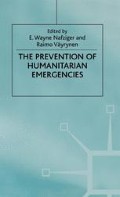Abstract
Experimentation with humanitarian delivery and protection continues as a dominant characteristic of world politics. The collective inability to act early highlights that ‘prevention’ has penetrated international discourse but not practice. The most striking Western reaction to humanitarian crises in the last half decade has been unleashing the humanitarian impulse, with outside military forces in the avant-garde.1
Access this chapter
Tax calculation will be finalised at checkout
Purchases are for personal use only
Preview
Unable to display preview. Download preview PDF.
Editor information
Editors and Affiliations
Copyright information
© 2002 The United Nations University/World Institute for Development Economics Research (UNU/WIDER)
About this chapter
Cite this chapter
Weiss, T.G. (2002). Multilateral Military Responses. In: Nafziger, E.W., Väyrynen, R. (eds) The Prevention of Humanitarian Emergencies. Studies in Development Economics and Policy. Palgrave Macmillan, London. https://doi.org/10.1057/9781403905321_12
Download citation
DOI: https://doi.org/10.1057/9781403905321_12
Publisher Name: Palgrave Macmillan, London
Print ISBN: 978-1-349-42802-1
Online ISBN: 978-1-4039-0532-1
eBook Packages: Palgrave Political & Intern. Studies CollectionPolitical Science and International Studies (R0)

